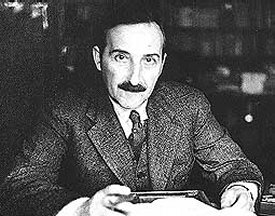Sometimes, while I’m waiting for a bus or something, I think this: would it be possible to write a novel with no characters in it? Does one exist? It’s my brain’s equivalent of wondering about the sound of one hand clapping – an exercise in auto-annoyance. With the exception of abstract philosophical texts, most books have characters: fiction, obviously, but also history and biography. Characters are central to plot, to state the obvious. Could you have a plot without characters? To paraphrase Patrick Heron it would be like having colour without form.
The reason this is coming back into my head is because I’m reading ‘The World of Yesterday’ by Stefan Zweig now, his semi-autobiography. I say ‘semi’ because he avoids revealing too much personal information, an interesting technique to adopt in an autobiography. Zweig (1881-1942) states that he wanted to describe the times he lived through rather than his own life.

The result is that for the first 100 pages or so, he manages to write a book without characters. People do appear, but they are incidental; the point is to conjure up an impression of fin de siecle Vienna. When Zweig refers to himself it is only to illustrate some small point, rather than to drive the plot. The voice is more often first person plural than singular, but unlike in Eugenides‘ ‘The Virgin Suicides’, where the narrative voice is also first person plural, it is not focused on another character. The focus of ”The World of Yesterday”s beginning is on something more ephemeral – you could call it the spirit of the age he describes.
So, is it effective? It is a bit of a relief when Zweig the person shuffles forward as he goes off to university. So far he’s still quite an incidental figure, but he’s enough of a focaliser. The beginning of the book is well-written and interesting but if it carried on so characterlessly it would be hard to read. So the answer seems to be that you can write a reasonably interesting book without characters – although it’s a damn sight better with them.
Zweig and his wife killed themselves in Brazil, a year after he finished writing ‘The World of Yesterday’. The events of the twentieth century had chased them out of Austria, and then out of Europe. He wrote in his remarkably cheerful suicide note that he was getting old, and couldn’t bring himself to start building a new life – exile being a young man’s endeavour. Although critics seem to think that his biographies are his greatest achievement, I love his fiction – short stories and novellas. There’s no shortage of characters in his work in general; I’ll have to see how this one proceeds.
You paraphrase Patrick Heron to say a novel without characters is colour without form. I beg to differ. A novel without characters is more like form with no colour.
LikeLike
PH is very interesting on this. He disagrees with Yves Klein’s YKB, saying that a monochromatic work is just an architectural panel rather than work of art. For him a painting should have internal organisation, structure. The ‘form’ of a YKB is determined by its surroundings rather than itself; it’s more art as though-experiment. Patrick Heron wasn’t interested in any other ‘meaning’ behind his work other than the interaction of colour and form – his painting aren’t thought experiments at all.
LikeLike